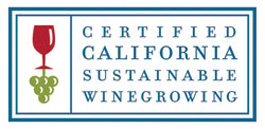home | north bay bohemian index | sonoma, napa, marin county restaurants | review

Sustainable Wines
By Alastair Bland
It may be the greatest question we face as wine buyers: "Is this bottle sustainable?"
Of course it isn't—it'll be gone by night's end. The wine industry itself, though, will hopefully last indefinitely, and early in 2010 the industry took a big step toward this magical goal. On Jan. 13, the California Sustainable Winegrowing Alliance (CSWA), a nonprofit created by the Wine Institute, launched a third-party certification program designed to better identify and honor wineries and vineyards that are making actual, honest efforts to reduce their impact on the environment and neighboring communities.
According to Allison Jordan, executive director of the CSWA, between five and seven accredited inspectors will be licensed to do the job of inspecting wineries and vineyards and rating them for sustainability across a comprehensive range of 227 criteria, including energy usage, water conservation and enhancing relations with customers and employees. Within these criteria, there are 58 prerequisites which companies must meet in order to be eligible for the program. Once certified, wineries and vineyards will be granted permission to post a CSWA logo on their websites and other marketing materials. A bottle label logo remains a future goal.
The program is entirely voluntary, requiring payment from winery or vineyard to the individual conducting the assessment. Naturally, the possibility of favoritism exists, and to prevent such lawlessness, fees may be capped. Moreover, repeated hiring of the same inspector at the same facility may be limited to prevent, say, inappropriate friendships from developing between parties.
Until now, CSWA has merely offered guidelines for companies to follow in voluntarily assessing themselves for sustainability. Frey Vineyards in Mendocino County, for example, one of the largest certified organic wineries anywhere, assessed itself several years ago under CSWA's guidelines, according to the winery's assistant winemaker Eliza Frey. The winery gave itself quite a good rating, too.
At Cain Vineyard and Winery in St. Helena, winemaker Chris Howell believes CSWA's new program is absolutely essential. "You can't self-assess," he says. "You need that third party."
Howell believes true sustainability is a profound notion. He points to vineyards in Europe that have operated for a thousand years.
"I'd like to see that for the Napa Valley," he says.
"Green" claims abound in many industries, often appearing on labels to influence consumer choices, and carefully monitored third-party review systems can add integrity, transparency and a critical eye to inspection and assessment. All wine bottles soon run dry, and even the industry will someday wither and fade, but the year 3000 is just 990 years away.
Send a letter to the editor about this story.
|
|
|
|
|
|